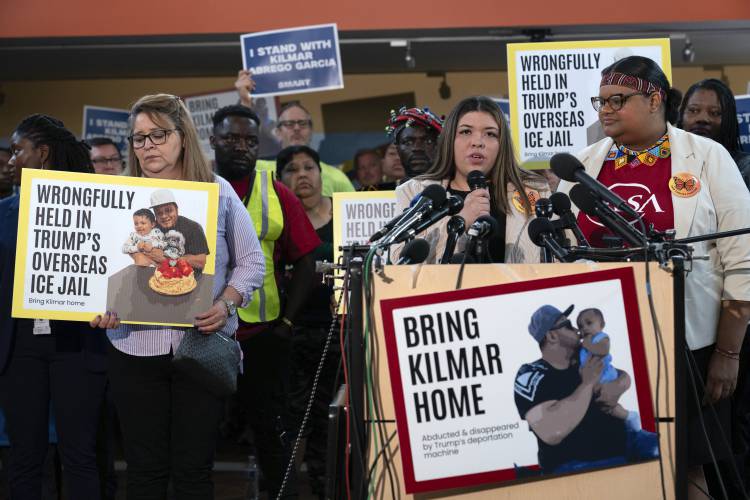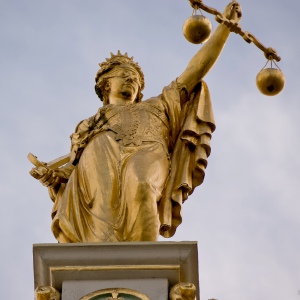Opinion: Black sites are us

Jennifer Vasquez Sura, the wife of Kilmar Abrego Garcia of Maryland, who was mistakenly deported to El Salvador, speaks during a news conference at CASA’s Multicultural Center in Hyattsville, Md., on April 4. Jose Luis Magana / AP
| Published: 04-14-2025 8:50 AM |
Jonathan P. Baird lives in Wilmot.
During the President George W. Bush war on terror years, the term “black site” entered the American lexicon.
Black sites were clandestine detention centers around the world where prisoners were held and tortured. The people taken to these secret locations were held incommunicado. They had no access to lawyers or any legal protection.
For almost twenty years, mention of black sites disappeared from our public life, but under the Trump administration, they are back. The mega-prison in El Salvador where the Venezuelan migrants were taken is a black site. It is a well-known hellhole, recognized for slave labor, torture and the worst cruelty.
Prisoners have no access to the telephone, the internet or any means of communication with the outside world. No one, including lawyers, can reach these prisoners. Because they have had no legal process, they are held indefinitely. They are entirely at the mercy of their jailers.
Part of the dehumanization process is shaving the prisoners’ heads, reducing any individuality like they were prisoners at Auschwitz. They become an undifferentiated mass who can be labeled terrorists, dismissed and forgotten.
This is our American gulag. Sending Venezuelan migrants to such a fate without any due process or hearing reflects a ramped-up lawlessness worthy of Kafka.
The case of a Maryland man, Kilmar Abrego Garcia, who was removed to El Salvador, perfectly illustrates the wrongfulness of black sites.
Article continues after...
Yesterday's Most Read Articles
 ACLU asks New Hampshire federal judge to reinstate student status for more than 100 international students
ACLU asks New Hampshire federal judge to reinstate student status for more than 100 international students
 Hopkinton structure fire spreads to surrounding brush and fields
Hopkinton structure fire spreads to surrounding brush and fields
 ‘People just want to speak up’ – Another large anti-Trump weekend rally in Concord
‘People just want to speak up’ – Another large anti-Trump weekend rally in Concord
 Concord’s Giant Indoor Yard Sale returns
Concord’s Giant Indoor Yard Sale returns
 Stalled seasonal visa system cancels Concord’s Kiwanis Fair scheduled for next month
Stalled seasonal visa system cancels Concord’s Kiwanis Fair scheduled for next month
Abrego Garcia made it to the U.S. in 2011. He moved to Maryland where he worked in construction. He met his future wife, an American citizen, and they started a family. In March 2019, he went to a Home Depot looking for day labor. The police picked him up and turned him over to ICE. They asked him if he was a gang member, and he denied he was.
For the next six months, federal agents sought to deport Abrego Garcia, saying he belonged to MS-13, a street gang. In court proceedings, the government produced the evidence they had compiled to prove Abrego Garcia was a gang member. They had an accusation from an uncorroborated confidential informant who lived in New York, a place where Abrego Garcia never was. They also argued that at the time of his arrest, Abrego Garcia was wearing a Chicago Bulls hat, which the agents said was proof of gang affiliation.
In October 2019, the immigration judge found the evidence was insufficient and ruled that Abrego Garcia could not be deported to El Salvador. For the next six years, he worked as a sheet metal worker and he started taking college courses at the University of Maryland. He and his wife had a third child. Between 2019-2025, he was never accused of or charged with any crime.
On March 12, everything changed. After finishing his shift at work and picking up his youngest child from his grandmother’s house, immigration agents stopped him on the way home. They told him he no longer had protected status in the U.S.. They said his wife had to be there in ten minutes or his five year old would be put in child protective custody. His wife arrived in time to see her husband handcuffed and taken away.
ICE shuffled Abrego Garcia around to different detention centers but for the first two days he was able to call his wife. Then, the calls stopped and his whereabouts were unknown. It turned out he was on the third plane that sent the Venezuelan migrants to El Salvador even though there was a court order that precluded that. The plane Abrego Garcia was stuffed into was one of the planes Federal Judge James Boasberg had ordered to turn around. In bad faith, the government disregarded the court order.
The Trump administration admitted in court that Abrego Garcia’s presence on the plane to El Salvador was an “administrative error,” but then it took the position that it could do nothing to return him to the U.S. The same government that placed DHS Secretary Kristi Noem inside CECOT for a photo op and made a deal with El Salvador’s president to receive the prisoners could do nothing to rectify Abrego Garcia’s situation.
Removal to a black site is un-American and entirely offensive to any notion of due process.
The Trump administration appears to believe it is fine to label someone a terrorist and based on the label, deprive them of all rights, without needing to prove anything. That is what they are doing to all the Venezualans sent to El Salvador.
If the Trump administration can disregard court orders, that practice could become the norm. The Supreme Court has ruled that the government must facilitate Abrego Garcia’s return to the United States. What happens to him next is of great concern to all Americans.







 Opinion: The Declaration of Independence is the antidote to Project 2025
Opinion: The Declaration of Independence is the antidote to Project 2025 Opinion: An attack on the legal profession is an attack on us all
Opinion: An attack on the legal profession is an attack on us all Opinion: HealthTrust's decision to drop anti-obesity medications is a step back in the fight against a chronic disease
Opinion: HealthTrust's decision to drop anti-obesity medications is a step back in the fight against a chronic disease
